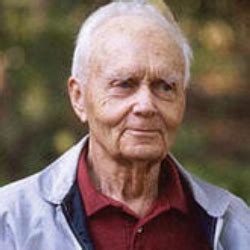Top 26 Quotes & Sayings by Joseph Chilton Pearce
Explore popular quotes and sayings by an American writer Joseph Chilton Pearce.
Last updated on April 15, 2025.
We are limited by our agreements on possibility. Agreement is a common exclusion of alternate possibilities. Agreement is the cement of social structure. Two or three gathered together, agreeing on what they are after, may create a subset in which their goals can be achieved, even though folly in the eyes of the world. The world in this case means a set of expectancies agreed upon, a set excluding other possibilities.
All children want to do is play in worlds they create and project on their external world. If allowed to do that, they are constantly building new neural structures for creating internal worlds and projecting them on their external world. And they build up an enormous self-esteem and feeling of power over the external world through their own capacities.
Ideal for the child and society in the best of times, Rudolf Steiner's brilliant process of education is critically needed and profoundly relevant now at this time of childhood crisis and educational breakdown. Waldorf Education nurtures the intellectual, psychological and spiritual unfolding of the child. The concerned parent and teacher will find a multitude of problems clearly addressed in this practical, artistic approach.






















